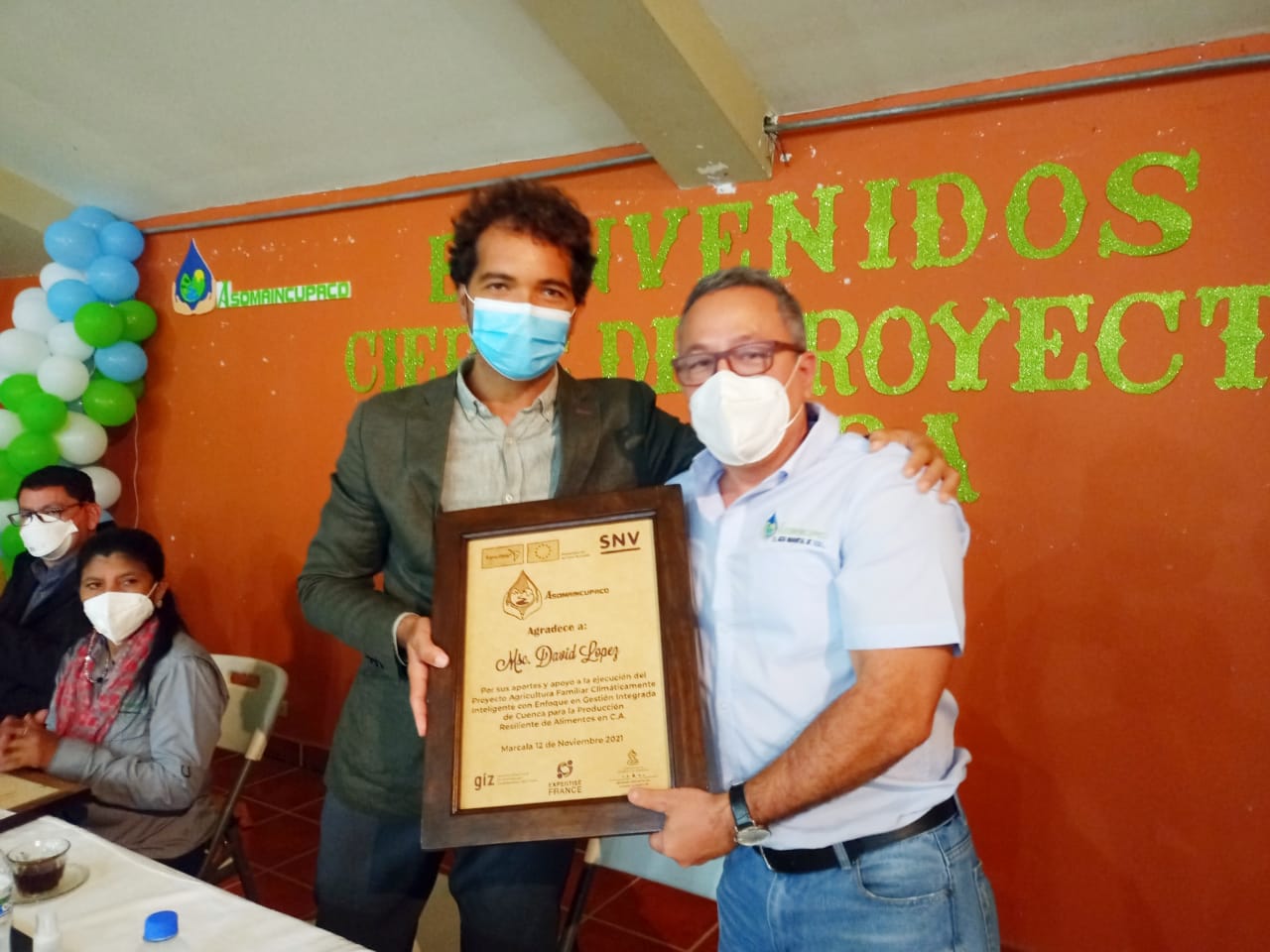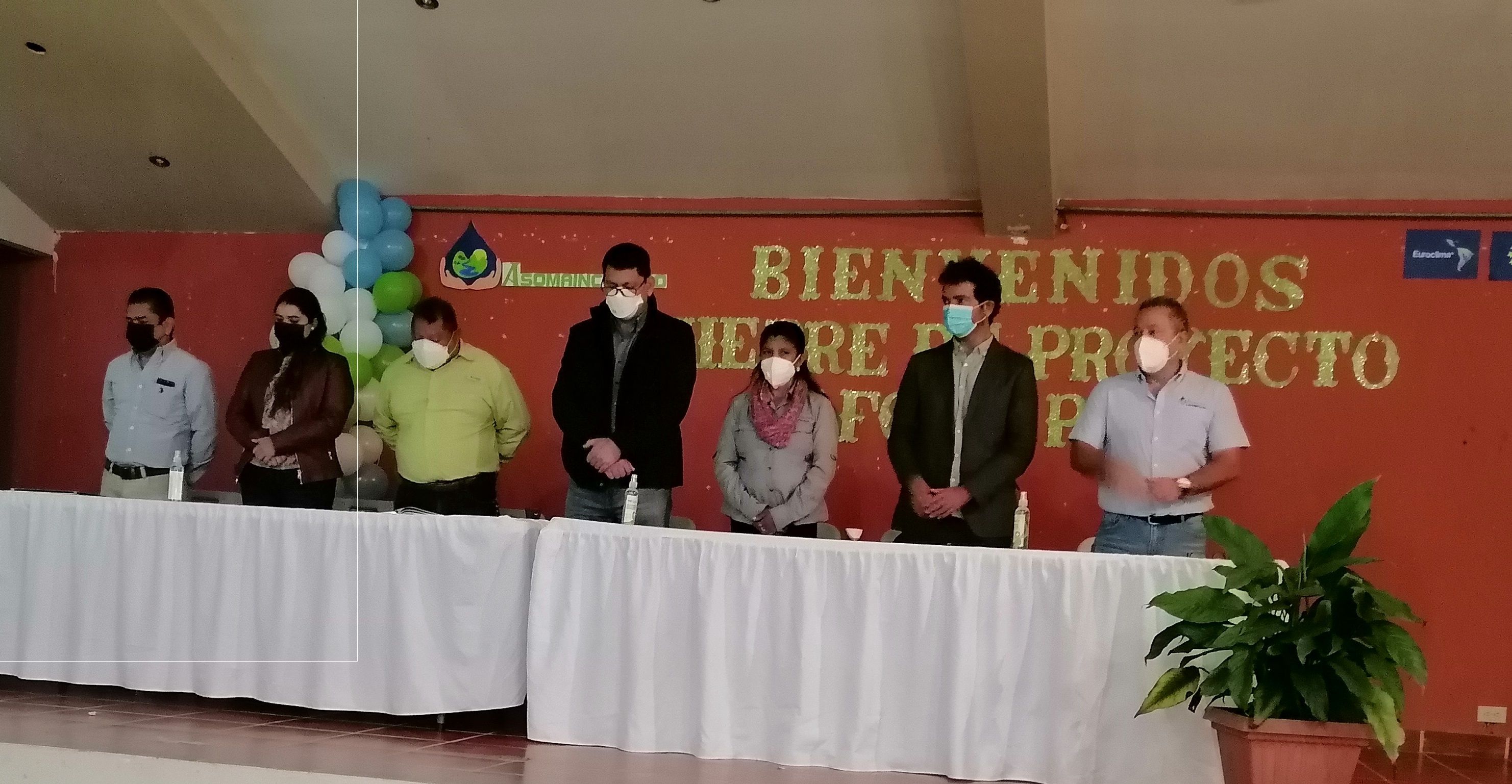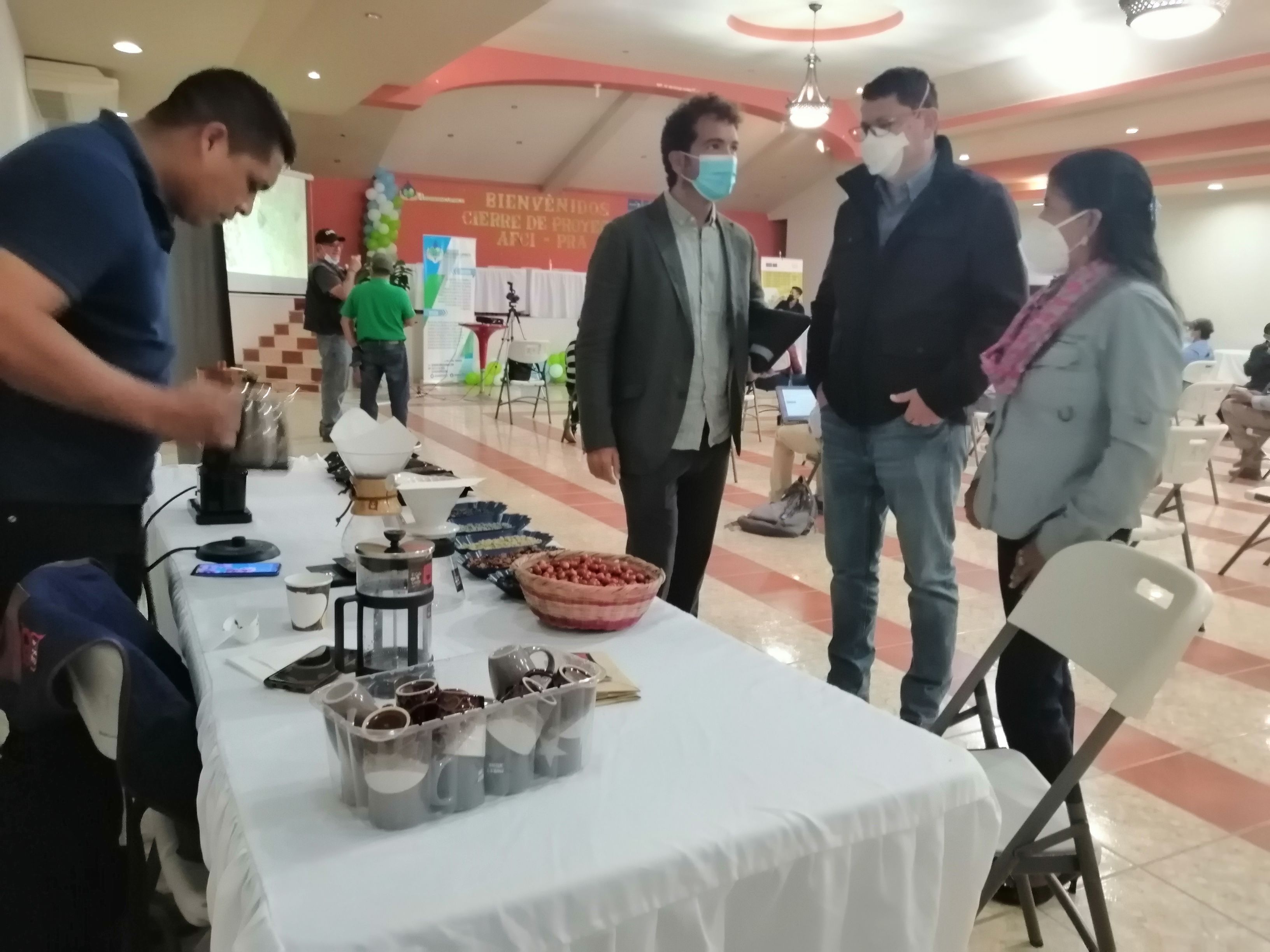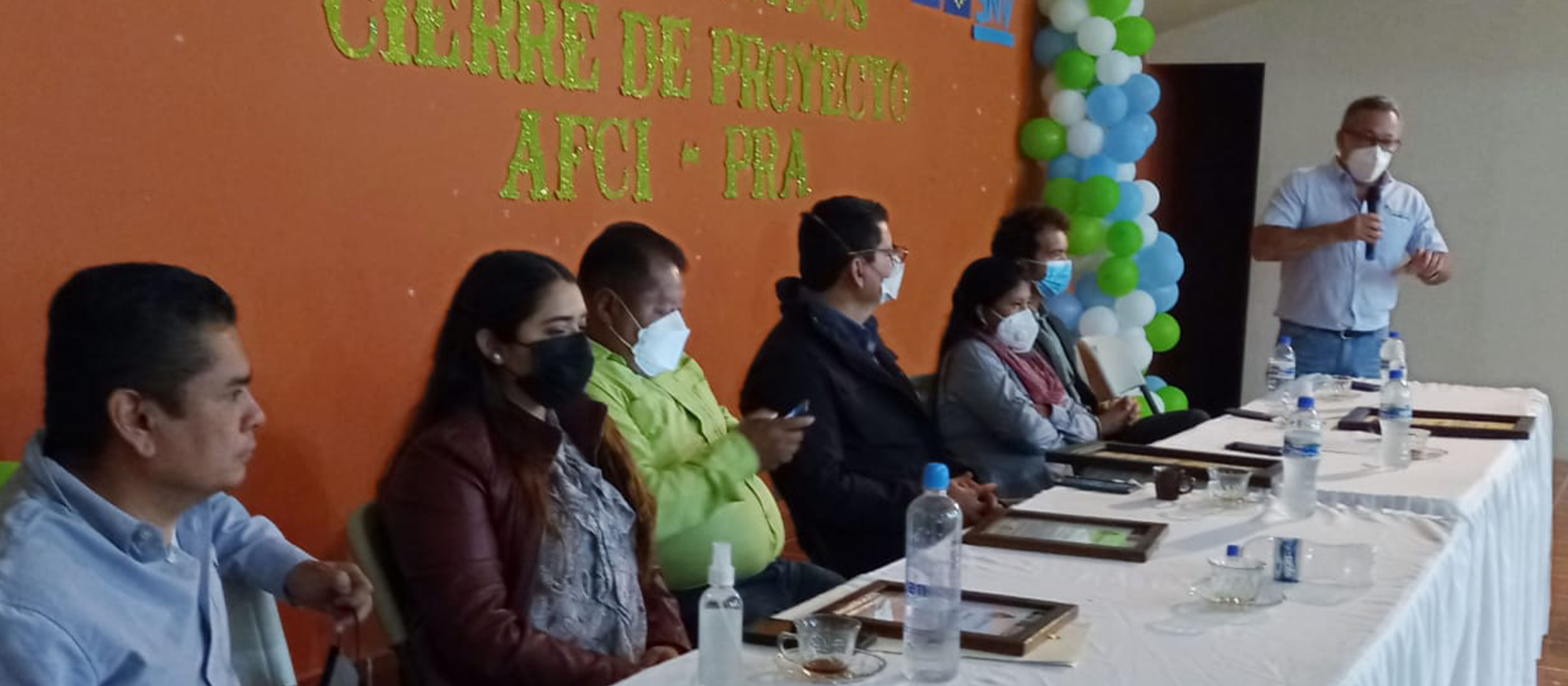The cycle of a successful project (AFCIPRA) that scaled up its model and proven solutions to another territory in Honduras has closed, said the Presidential Delegate for Climate Change, Dr. Marlon Escoto.
Honduras, 16 November 2021 - The results of the Climate-Smart Family Farming for Resilient Food Production Project (AFCIPRA) were presented in the presence of ministerial authorities, representatives of the project's executing and co-executing entities, local authorities and representatives of local stakeholders in the project's area of influence in Honduras. The project actions are part of the work of EUROCLIMA+ in the of Resilient Food Production in Central America sector.
The AFCIPRA project achieved its objectives. Some 882 producers reduced their vulnerability to climate change and improved their capacities for resilient food production as a result of the implementation of the project, said its coordinator, Douglas Benavidez of the Netherlands Development Cooperation Service (SNV), during the presentation of results.
The project supported the 882 individual producers (269 women) of the productive chains: honey, coffee, basic grains and livestock, with investments, training and technical assistance in practices for Resilient Food Production (RFP).
AFCIPRA had an investment of more than 1.2 million euros provided by the European Union, through EUROCLIMA+. It promoted, from June 2019 to December 2021, resilient food production in Lenca indigenous communities and the mestizo population, under a sustainable water resource management approach in the El Venado and Chiflador/Guaralape basins in Honduras.
 |
David López, Director of SNV and Julio Coll, Director of Asomaincupaco
It was implemented by the Netherlands Development Cooperation Service (SNV), the Association for Integrated Watershed Management of the La Paz and Comayagua Watersheds (ASOMAINCUPACO), and the Presidential Office for Climate Change of Honduras (ClimaPlus) and the Ministry of Environment of Guatemala as political counterparts.
The presentation of results was attended by the Presidential Delegate for Climate Change of Honduras, Dr. Marlon Escoto, the director of SNV Central America, Mr. David López, the president and director of ASOMAINCUPACO, Ms. Flora Hernández and Mr. Julio Coll, the mayor of Santa Ana, Mr. German Mendoza, the vice mayor of Marcala, Ms. Erika Argueta, Mr. Pedro Jeremías Gonzales, representative of the Honduran Federation of Indigenous Lenca (FHONDIL), representatives of the Micro-watershed Councils, producers of coffee, basic grains, honey and livestock, and the media, among others.
The representative of FHONDIL, Mr. Pedro Jeremías Gonzales, thanked the European Union for its support to the Lenca people. He indicated that the producers in the area have expressed their satisfaction with the actions of the project and the experiences they had that were applied with respect and consideration for the indigenous people.
"This is about respecting rights, our people are left with knowledge, the communities have been strengthened by this project and our people continue to move forward," said the indigenous leader.
The Project Coordinator, Douglas Benavidez, indicated that a process of capacity building was worked on to generate skills in small producers and their families to produce food despite climate change, climate variability and all the negative externalities to which they are exposed.
"The project has left a lesson in each one of us, if we put it into practice and continue, the project does not end, we move forward. If they taught us how to fish, we must teach others and multiply the knowledge. What we have learned must be shared and we must remember the knowledge that the technicians gave us", emphasised producer Dagoberto Melgar.
Meanwhile, David Lopez, director of SNV, reiterated that this project has brought many benefits, that it has been an alliance and multi-actor work from the European Union, ClimaPlus, Asomaincupaco, mayors, and producers, and he hoped it would be sustainable: He added that SNV has the role of facilitator so that the communities can participate in their own development and that they will seek ways to continue supporting it.
 |
Water governance mechanism created and strengthened
Another result of the project was the promotion and implementation of a multi-stakeholder and multi-level water governance model. This was established in accordance with current Honduran legislation and allowed for the participation of multiple stakeholders in the process. Likewise, a water governance structure was established that considers the watershed as the management unit and water as the integrating resource.
The project worked hand in hand with the General Directorate of Water Resources and the municipalities to conduct this process, which resulted in the formation of two Micro-watershed Councils, El Venado and Chiflador-Guaralape. These councils are in charge of the management of ecosystem goods and services and the general management of the basin.
In addition, two micro-watershed water action plans were developed as a management tool, which is guiding the governance structures on how to properly manage water resources.
Fredi Velásquez, president of the Río Venado Micro-basin Council, pointed out that the AFCIPRA project created the Micro-basin Council and considered all the organisations that are in a municipality. "This project closes, but it left something very important, which was the Trainer of Trainers diploma with which the knowledge will be replicated in the future, this must be sustainable," added the leader.
For her part, the president of Asomaincupaco, Flora Hernández, stressed that the project used the watershed approach, which is where livelihoods are developed, and where producers do many things to change production with what the technicians teach. She called on the producers to continue implementing the knowledge.
The leader pointed out that work was carried out in three Micro-basin Councils, in coordination with various actors, and they joined together to work for the development of the communities.
 |
A green inclusive financing model was designed
Another outcome was the design of an Inclusive Green Rural Finance Model. The model proposes the most suitable financial product for a small producer to access credit for resilient food production, which would enable the sustainability of food production in smallholder families.
In addition, economic empowerment activities were promoted with women through the creation of Self-Management Groups (Spanish acronym GAG) for savings and loans. Twenty GAG groups were organised with the participation of 247 women. The GAGs have collected savings of 4.3 thousand euros and provided loans to users of 10.5 thousand euros.
Sustainability
For his part, the Presidential Delegate for Climate Change, Dr. Marlon Escoto, highlighted that when the AFCIPRA Project was born, it became a reference point in Latin America, exploring issues that had not yet appeared, such as climate finance.
Escoto reported that the SNV team shared the experience of the project at COP26 and there is an obligation to close the cycle of a successful project like AFCIPRA and open another in other territories. AFCIPRA has already inspired another project in the territory of El Paraíso, he added.
He reported that the project executors, ASOMAINCUPACO and SNV, have formulated a Concept Note using the same model as the AFCIPRA Project to scale up the experience to other regions of the country, with a view toward scaling it up in the region, taking into account the synergies already built with other implementers in the Resilient Food Production (RFP) and Forest and Biodiversity (FBE) sectors.
AFCIPRA's scaling up will be in the coffee chain with a focus on Agroforestry Systems, with greater emphasis on Inclusive Green Rural Finance and economic empowerment through models such as sustainable value chains and inclusive businesses.
To conclude, Escoto told the AFCIPRA beneficiaries that "the projects are a big push and the most important thing is what you have learned and see looking ahead".
More information
Editor: Judit Vanegas, Communication Specialist AFCIPRA This email address is being protected from spambots. You need JavaScript enabled to view it.
This email address is being protected from spambots. You need JavaScript enabled to view it.This email address is being protected from spambots. You need JavaScript enabled to view it.
Sources of photos: AFCIPRA Project closing event



